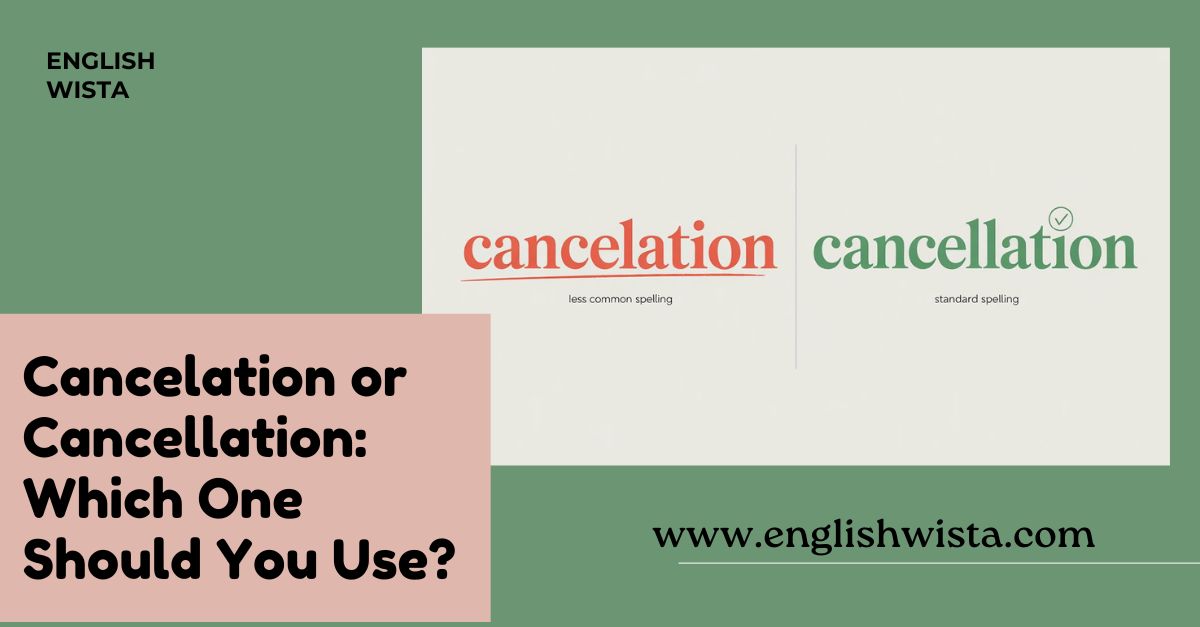Have you ever sat down to write an email, typed the word cancelation, and then suddenly wondered, “Wait, is that spelled right? Should it be cancellation with two L’s instead?” If you have, you’re definitely not alone. This is one of those tricky word pairs that often cause people to pause, scratch their heads, and sometimes even second-guess their spelling skills.
The good news? You’re not making a big mistake either way. Both versions of the word exist, but one is much more common than the other. In this article, we’re going to break it all down step by step so you’ll never feel unsure about this again. We’ll look at the definitions, spelling differences, usage in different countries, fun facts about the word’s history, and even some real-life examples you can use as a guide.
By the end, you’ll feel confident every time you need to write this word whether it’s in a professional email, a social media post, or even just a quick text to a friend.
What Does “Cancellation” (or “Cancelation”) Mean?
Let’s start simple. Both cancellation and cancelation come from the verb cancel. To cancel something means to stop it from happening, end it before it begins, or declare it no longer valid.
Here’s a quick definition:
- Cancellation (or cancelation): the act of canceling something.
Think of it like this: when your favorite concert gets called off because of bad weather, that’s a cancellation. When a TV show doesn’t get renewed for another season, that’s also a cancellation. Even when you call a hotel to say you won’t be staying there anymore, you’re making a cancellation.
In short, the word is used whenever something planned is stopped, erased, or undone.
Why Are There Two Spellings?
Here’s where things get interesting. The two versions cancellation (with two L’s) and cancelation (with one L) exist because of spelling differences in English over time.
English is known for borrowing words and changing spellings, which sometimes leads to more than one “correct” version of the same word. In this case:
- Cancellation is the more common spelling worldwide.
- Cancelation is a less common variant, mainly seen in the United States.
So, it’s not that one is wrong and the other is right. It’s more about which spelling people are used to seeing in different places.
Which One Is Correct: Cancelation or Cancellation?
If you want the short answer: cancellation (with two L’s) is the preferred spelling in most English-speaking countries, including the U.S.
Yes, you read that right. Even though cancelation pops up in American English sometimes, dictionaries and style guides almost always list cancellation as the main form. For example, Merriam-Webster, which is an American dictionary, marks cancelation as a variant but not the primary spelling.
So if you’re writing something important like a school paper, a business email, or an article you’ll be safest using cancellation.
Does Location Matter?
Let’s take a quick look at how the word shows up around the world:
- United States: Both cancellation and cancelation exist, but cancellation is far more common.
- United Kingdom, Canada, Australia, India, and most other English-speaking countries: Only cancellation is widely accepted and recognized.
In other words, if you’re writing for an international audience, always stick to cancellation. It’s the universal favorite.
Why Does Cancellation Have Two L’s?
This question comes up a lot. Why not just one L like in cancel?
The answer lies in how English handles word endings. When you add certain suffixes, like -ation, to verbs that end with a single vowel and consonant (like cancel), the final consonant (the L) is often doubled.
For example:
- Travel → Travelling (in British English)
- Control → Controlling
- Cancel → Cancellation
Doubling the L makes the word easier to pronounce and keeps the original stress in the word. That’s why cancellation looks a little heavier but also feels more natural when spoken.
Real-Life Examples of Cancellation
Let’s look at some everyday ways this word shows up in sentences.
- The airline announced the cancellation of all flights due to the storm.
- We were disappointed by the cancellation of the concert.
- The hotel confirmed my room cancellation via email.
- Netflix fans were upset about the cancellation of their favorite series.
- The sudden cancellation of classes made students very happy.
Notice how in each case, the word simply means something that was planned didn’t happen.
Now, here are the same sentences using the less common spelling (cancelation). While they aren’t wrong, they just look unusual:
- The airline announced the cancelation of all flights due to the storm.
- We were disappointed by the cancelation of the concert.
See what I mean? Your eyes almost expect that second L to be there.
Is Cancelation Still Acceptable?
Yes, but with a warning. While cancelation is technically correct, it can look like a spelling mistake to many readers especially outside the U.S. Even inside the U.S., people are much more familiar with cancellation.
So, unless you’re writing something very informal (like a text to a friend), it’s better to stick with cancellation.
Fun Facts About the Word
Here are a few little extras that make this word more interesting:
- Latin roots: The word cancel comes from the Latin word cancellare, which means “to cross out.” That’s why cancellation feels connected to erasing or stopping something.
- Historical use: Early English texts from the 1600s used both cancelation and cancellation. Over time, the double-L version won the popularity contest.
- Modern trends: Thanks to spellcheckers and dictionaries favoring cancellation, the single-L version is slowly fading away.
Common Misconceptions
- “Cancelation must be American English.”
Not exactly. It shows up in American English more than anywhere else, but even in the U.S., most people use cancellation. - “Cancellation looks too long it must be wrong.”
It may look heavier than cancelation, but it’s actually the correct and most accepted form. - “Both spellings are interchangeable everywhere.”
Technically true, but not practically. Readers outside the U.S. will almost always expect cancellation.
Tips to Remember the Correct Spelling
Here are some tricks to keep it simple:
- Think of “call” in the middle. The double L in cancellation makes it look like the word call. Imagine you’re “calling off” something that’s a cancellation.
- Follow the crowd. Since most dictionaries, schools, and companies prefer cancellation, you’re safest using it.
- Check your spellchecker. Most word processors will flag cancelation as unusual and suggest cancellation.
Practical Scenarios
To make it even clearer, let’s look at some real-life contexts where you might use this word.
- In Business:
“Our meeting has been postponed due to the cancellation of the speaker’s flight.” - In Travel:
“Trip insurance can help cover unexpected cancellations.” - In School:
“The sudden cancellation of exams was a relief to students.” - In Entertainment:
“The show’s cancellation shocked the entire fan community.”
See how it works across different areas of life?
Conclusion
So, let’s wrap this up in a friendly way. The big question was: cancelation or cancellation? The answer is simple cancellation (with two L’s) is the most widely accepted and safest spelling to use.
While cancelation isn’t technically wrong, it’s rare and can look odd to many readers. If you want to sound polished, professional, and clear, always go with cancellation.
Next time you’re typing an email, posting on social media, or writing an assignment, you won’t have to hesitate. You’ll know exactly which version to use and you can even explain the difference to others if they’re confused.
So, the takeaway is this: when in doubt, double the L.



